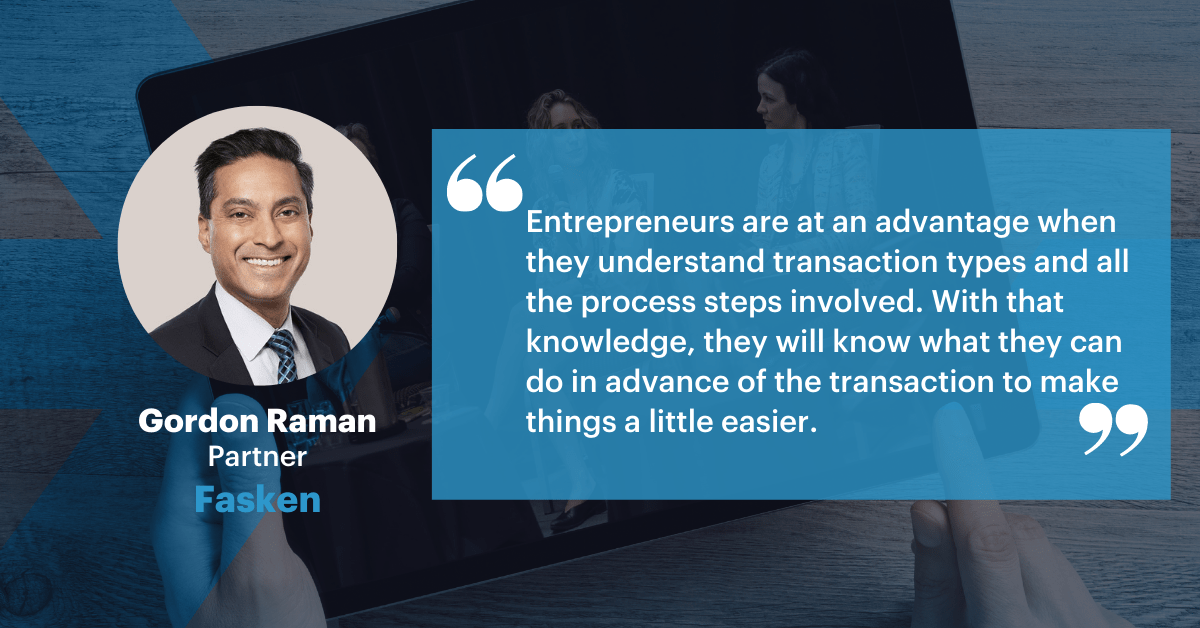Deal Killers: Preparing for Transaction Challenges
TechExit

For those working in the world of mergers and acquisitions, there are a lot of stars that have to align before the champagne cork pops. Given the state of our economy and new pandemic work norms, the risks may seem greater than ever, but today’s environment may also be ripe with opportunity for some lucky business owners. The secret to deal making is knowing what might kill a deal and then taking deliberate steps to minimize risk and maximize the success of the transaction.
Gordon Raman, a partner at Fasken in Toronto, practises in the areas of mergers and acquisitions, corporate governance and corporate finance. We recently chatted with Gordon, who is part of the TechExit East Deal Killers: Preparing for Transaction Challenges expert panel, about the challenges that can cause a deal to go sideways, or worse!
As you look at the panel, what do you hope attendees take away from the conversation about the risks entrepreneurs face after receiving an offer?
I’d like business owners to understand what the transaction process entails; it is usually longer and more complicated than expected. Every transaction is different, but all will follow the same process and complete similar milestones in the process. Sometimes the timing varies.
Entrepreneurs are at an advantage when they understand transaction types and all the process steps involved. With that knowledge, they will know what they can do in advance of the transaction to make things a little easier. If you’re looking to sell, it’s important to know you have the right resources—internal and external—in advance of the deal.
What are the most common transaction challenges/deal killers?
Sometimes how a business is papered will kill a deal. The buyer wants to understand the “certainty” around the business it is buying – how certain are cashflows, the employee and customer relationships, the ownership of assets, etc.? The easier it is for the vendor to demonstrate this “certainty” (usually by previously having documented well all the aspects of the business), the easier it is for the buyer to have confidence in the business. The more difficult it is for the vendor to demonstrate this certainty, or the longer it takes vendors to do so, means a potential buyer could start to lose confidence in the business and a deal could start to unravel.
Another common challenge is really knowing what you want from a deal and understanding what you are going to have give up to get it. Are you really comfortable with the compromises and the stress this may cause you? Giving up ownership also means giving up control. Make sure you truly know what you want before you engage in the deal process.
What can business owners do to avoid deal killers?
- Keep organized and have access to all financials, written contracts, and employment records so potential buyers can conduct due diligence.
- As you grow your business, think about your eventual exit strategy. Who gets to own business with you? Friends and family, employees, minority investors, the broader the ownership, the more people have a say in the sale of a business. It’s still possible to retain control of the decision-making process and your decision to sell, but it will require forethought.
- As you get ready for a deal you may not realize how much work it takes. It’s a lot to oversee an exit transition and run a business. Having someone in-house, or an external advisor, dedicated to the exit process may help.
How has the global pandemic impacted due diligence?
For the most part, people are more and more comfortable with conducting due diligence virtually. Management presentations and document reviews can all be done on-screen. Although people are more comfortable with remote work, M & A transactions are very relationship focused. Belief in the company’s founder, what they’ve done and what they’ve built is a key component to the deal. Often that person is needed to continue on with the company and direct the business for some period of time. Relationship building is not as easily replicated on a Microsoft Teams meeting as it is by face-to-face encounters. For this reason, the deal may take more time.
What advice do you have for entrepreneurs preparing for a potential sale?
Having a good relationship with your professional advisors (whether it is you tax, financial or legal advisor) is critical to helping you navigate through difficult conversations and situations. It is much easier to resolve challenges, and feel confident in those resolutions, if you trust the people you are working with. When you are looking to hire professionals don’t underestimate the worth of the advisor relationship. Spend time together to see and understand who they are and how they will approach your transaction.
Gordon will be speaking on the panel Deal Killers: Preparing for Transaction Challenges at TechExit NOW Eastern Edition. Don’t miss out! Register today.
BACK






